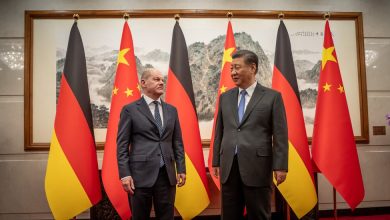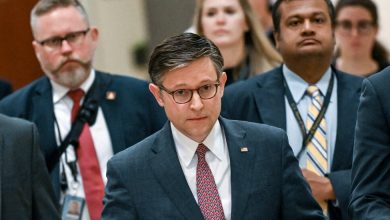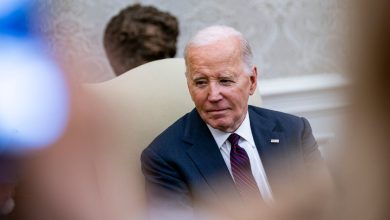A Russian Pledge of No Invasion? Ukrainians Are Skeptical.

KYIV, Ukraine — It sounded like a reassuring pronouncement: Russia’s deputy foreign minister, Sergei A. Ryabkov, declaring after negotiations with the United States that, “we have no intention to invade Ukraine.”
But skepticism ran deep on Tuesday inside Ukraine, where politicians were quick to discount the pledge Mr. Ryabkov made on Monday after meeting with American negotiators on Eastern European security.
“When Russians says, ‘No, no, no, we don’t want to invade Ukraine’ what they mean is, ‘Yes, yes, yes, we do want to invade Ukraine,’” said Oksana Syroid, a former deputy speaker of Parliament.
Oleksandr Danylyuk, a former Ukrainian national security adviser, alsodiscounted Mr. Ryabkov’s promise. “It’s not so important what they say now,” Mr. Danylyuk said. “What I don’t want to happen is, after some time, the Russians saying, ‘we didn’t intend to invade, but….’”
“They can always put a comma after it and say, ‘but.’” he added. “The Kremlin is very good at this.”
There were at least some positive signs for Ukraine to come out of Monday’s high-stakes negotiations in Geneva, analysts said. Russiacalled the talks “deep” and “concrete” and committed to continue negotiations this week — with NATO on Wednesday and the Organization for Security and Cooperation in Europe on Thursday. The O.S.C.E. talks will include Russia and Ukraine, the first high-level, publicly announced meeting recently that will include both countries.
Mr. Ryabkov said that the outcome of those discussions would determine whether Russia was willing to proceed with diplomacy.
Ukraine’s foreign minister, Dmytro Kuleba, also offered a positive assessment of the Geneva talks, from Ukraine’s standpoint, telling local media they had shown Russia that the United States would not negotiate on European security guarantees until after Moscow withdrew forces from the Ukrainian border.
“Regardless how often Russian diplomats circle around these issues, the starting point for discussing security guarantees in the European space should begin with Russia de-escalating the situation along Ukraine’s border,” Mr. Kuleba said.
Russia laid out sweeping demands last month that sought to roll back NATO’s military presence in Eastern Europe to 1990s levels and asked for guarantees the alliance would not expand eastward or keep forces or weapons in former Soviet states. At the same time, it has massed about 100,000 troops on Ukraine’s border and delivered threatening rhetoric that has put the West on edge, fearing an invasion.
While offering the assurance that Moscow did not intend to invade Ukraine, Mr. Ryabkov also said that if Western countries did not agree to Russia’s demands on NATO it would put “the security of the whole European continent” at risk. He did not specify what that meant.
Ms. Syroid, who is the leader of the Self Reliance party that is based in Western Ukraine, said she had little doubt Russia wanted to regain control over Ukraine. But she added that the military buildup and Russian commentary that has toggled between ominous and more conciliatory may not be a prelude to a wider war as much as leverage to extract political concessions from rattled Western governments and Ukraine.
Mr. Danylyuk, the former national security adviser, said the broader picture remained ominous for Ukraine. The Geneva talks left both sides essentially where they started, only with the opposing, and seemingly intractable, positions now laid out more formally. Mr. Ryabkov said Ukraine must “never, never, ever” become a member of NATO; the U.S. responded by saying it would never make such a commitment.
“What it means for Ukraine, what is important, is these positions are voiced and they are clearly irreconcilable,” Mr. Danylyuk said. “Obviously, we watch the developments quite closely.”
By Tuesday, some Ukrainian analysts were drawing conclusions that Russia would end the week of talks with no concessions. NV, a political news site, called the talks in a headline “Russia’s Foreign Policy Fraud.”
But two announcements on Tuesday by Russia and Belarus of military patrols and exercises near Ukraine’s borders suggested the risks of failure.
Russian and Belarusian jet fighters carried out joint flights near Ukraine, the Belarusian military said. And Russia’s western military district announced a live-fire exercise with 3,000 soldiers and 300 armored vehicles that included tactics for maneuvering through territory while under attack.
Preparing for the possibility that the talks will break down, Ukraine has been pursuing a parallel track of diplomacy with Russia more narrowly focused on resolving the eight-year-old conflict in eastern Ukraine. The office of Ukraine’s president, Volodymyr Zelensky, issued a statement Tuesday related to this effort, after meeting the day before with envoys from France and Germany.
Kyiv was preparing for a four-way summit involving Ukraine, France, Germany and Russia under a long-running negotiating format called the Normandy Four, the statement said. President Emmanuel Macron of France voiced support last week for such a gathering.
The proposed European summit is also a plank in a diplomatic initiative Ukraine began quietly last month to negotiate with the Russian government on a separate channel from the talks underway this week in Europe.
“It is time to agree in a substantive manner for ending the conflict, and we are ready for the necessary decisions during the new summit of the leaders of the four countries,” Mr. Zelensky said in his statement Tuesday.
Misdirection has historically been pivotal to Russian military doctrine, which places emphasis on denial, deception and propaganda intended to slow the opposing side’s responses. The annexation of Crimea in 2014, for example, began with the appearance of masked and mysterious men in unmarked uniforms, the so-called Russian green men. Russia’s president, Vladimir V. Putin, later admitted they were Russian soldiers.
When they also appeared in eastern Ukraine later that year, one of the leaders of the Russian-backed separatists, Aleksandr V. Zakharchenko, said between 3,300 and 4,000 Russian soldiers had deployed, but all while on their vacations. “There are active soldiers fighting among us who preferred to spend their vacation not on the beach but among their brothers, who are fighting for freedom,” he said.
That evoked a Soviet ruse from 1983, when soldiers in an antiaircraft unit were deployed to Syria under the guise of tourists, having been asked first by their commanders to grow out their hair to make the disguise more plausible.
In fact, nearly every Russian and Soviet deployment over the past half century —from the Prague Spring to Afghanistan, Chechnya and Ukraine — opened with a simple but effective trick: soldiers appearing first in mufti or unmarked uniforms amid official denials from Moscow of military action.



